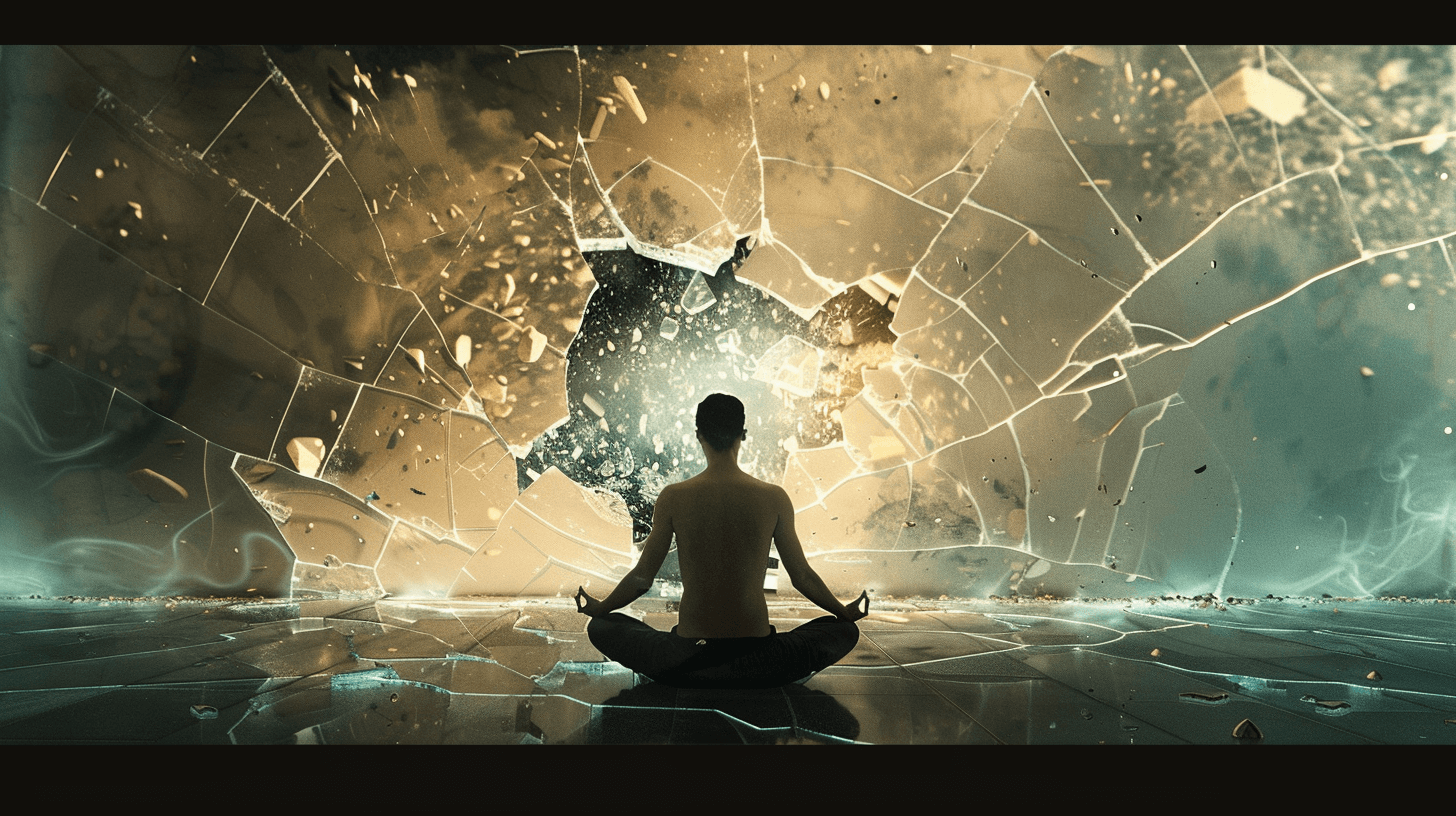Introduction to Spiritual Awakening Through Suffering

We’ve all experienced moments of suffering—times when life’s challenges feel overwhelming, and we wonder why we have to endure such pain. What if I told you that these moments of suffering hold a profound key to your spiritual awakening? While it may seem paradoxical, many spiritual traditions and thinkers believe that suffering is not just an unfortunate part of life, but a powerful catalyst for transformation. It’s through hardship that the Ego weakens, and our deeper, truer self begins to emerge.
Spiritual awakening isn’t a sudden event but a gradual process of shedding old layers, beliefs, and attachments. And, often, suffering accelerates this process. Whether you’re facing emotional pain, loss, or a deep sense of dissatisfaction with life, understanding the role of suffering can offer a new perspective—a path toward spiritual growth and enlightenment.
The Role of Suffering in Spiritual Transformation

Pain has a way of breaking us open, exposing vulnerabilities we might otherwise ignore. When things are easy, we often coast through life, sticking to our routines and avoiding the deeper questions. But suffering? It forces us to stop and reflect. It strips away illusions, making room for something new—something more authentic and spiritually aligned.
In spiritual terms, suffering is often viewed as a means to dissolve the Ego. The Ego is that part of us that clings to identity, labels, and the external world for validation. It’s the part that fears loss, change, and uncertainty. When we suffer, we confront the limitations of the Ego head-on. As the Ego struggles to maintain control amidst hardship, it begins to unravel, giving us a glimpse of the deeper self—the one that transcends material concerns and temporary emotions.
Take, for example, the stories of individuals like Viktor Frankl, a Holocaust survivor, who found meaning in the depths of suffering. In his groundbreaking book Man’s Search for Meaning, Frankl explains that even in the most horrific circumstances, human beings have the power to choose their attitude. It’s this shift in perspective that leads to spiritual growth. Frankl’s suffering did not crush his spirit; rather, it fueled his transformation, guiding him toward a more profound understanding of life.
Likewise, in many spiritual practices, suffering is seen as a necessary stage in the journey toward enlightenment. It’s the process of going through the fire and emerging purified, stripped of the illusions of the Ego. In Buddhism, for example, the Four Noble Truths begin with acknowledging suffering (dukkha) as an inevitable part of existence. It’s only by fully recognizing suffering that one can begin to transcend it.
How Different Spiritual Traditions View Suffering

Each spiritual tradition has its own interpretation of suffering, but one thing remains constant: suffering is never viewed as pointless. Instead, it’s seen as a tool for awakening, for evolving beyond the ordinary, and for connecting with the divine.
Buddhism: Perhaps no other spiritual tradition addresses suffering as directly as Buddhism. The very foundation of Buddhist teachings lies in the understanding of suffering. The Buddha taught that life is inherently filled with suffering, but through mindfulness, meditation, and ethical living, one can overcome it. The ultimate goal is to achieve Nirvana—a state of enlightenment that ends the cycle of suffering. The path to this spiritual awakening requires facing suffering head-on and using it as a means to detach from cravings and desires, which are often the root causes of pain.
Christianity: In Christianity, suffering is often associated with redemption and growth. Christ’s suffering on the cross is seen as the ultimate act of love and sacrifice, offering salvation to humanity. Christians believe that personal suffering can lead to a deeper connection with God. It is through enduring trials and tribulations that one’s faith is tested and ultimately strengthened. Many saints and mystics, such as St. John of the Cross, wrote extensively about the “dark night of the soul,” a period of intense spiritual suffering that precedes divine illumination.
Hinduism: In Hinduism, suffering is understood through the lens of karma—the universal law of cause and effect. Suffering is often seen as the result of actions in past lives, and it serves to purify the soul, helping it progress on its journey toward moksha, or liberation. Hindu teachings suggest that by accepting suffering and using it as a form of self-discipline, individuals can burn off negative karma and move closer to spiritual freedom.
Across all these traditions, the common theme is clear: suffering is not a punishment or a sign of failure. It is an opportunity—a gateway to spiritual awakening.
Practical Steps to Achieve Spiritual Awakening Through Suffering

It’s one thing to understand suffering intellectually, but it’s another to actively use it as a tool for spiritual awakening. The question remains: how can you turn your own suffering into a path for growth?
Practice Mindfulness and Meditation: One of the most effective ways to transform suffering is to become fully present with it. Instead of resisting pain or trying to escape it, sit with it. Through mindfulness and meditation, you can observe your suffering without becoming attached to it. This detachment allows you to see pain as a temporary state, rather than something that defines you. Apps like Calm or Headspace offer guided meditations that can help you navigate moments of emotional distress.
Journaling for Self-Reflection: Writing about your suffering can help you gain clarity and insight. What are the deeper emotions behind your pain? What lessons might this experience be teaching you? Journaling provides an outlet for processing difficult emotions and can reveal patterns that point toward spiritual growth.
Gratitude Practice: It may seem counterintuitive, but cultivating gratitude in the midst of suffering can shift your perspective. Start by acknowledging small blessings each day, even if they seem insignificant. Over time, this practice can open your heart, helping you see that suffering and joy often coexist, and one can deepen your appreciation for the other.
By embracing these practices, you begin to see suffering not as something to avoid, but as a powerful tool for inner transformation.
Real-Life Stories of Awakening Through Suffering

Suffering may feel isolating, but history and personal narratives show us that many have walked this path before—and found profound transformation on the other side. It’s often in our darkest moments that we find the greatest capacity for light. The following stories illustrate how pain and hardship can become the very foundation for spiritual awakening.
Oprah Winfrey is a prime example of someone who turned suffering into spiritual evolution. Born into poverty and subjected to abuse, her early life was filled with hardship. But through introspection and a relentless pursuit of meaning, Oprah transformed her pain into a global mission of empowerment and enlightenment. Her experiences allowed her to connect with millions, teaching that suffering can fuel not only personal growth but also a greater purpose to uplift others.
Another powerful story comes from Maya Angelou, whose childhood traumas included sexual assault and long periods of silence. Yet, it was through this silence that Angelou connected with her deeper self, ultimately giving rise to her voice as one of the most powerful writers and poets of the 20th century. Her suffering became a beacon of hope and resilience, inspiring others to embrace their pain as a means of finding inner strength and purpose.
These stories remind us that suffering, though painful, can be the crucible in which our deepest spiritual truths are forged. In each case, the suffering was not the end of the story but the beginning of an extraordinary journey toward enlightenment.
The Benefits of Embracing Suffering for Spiritual Growth

Now that we’ve seen how suffering can catalyze transformation, it’s important to recognize the tangible benefits of embracing suffering rather than resisting it. When we allow ourselves to fully experience pain—rather than running from it or numbing it—we unlock doors to wisdom, compassion, and spiritual growth that were previously closed. Here are some of the key benefits of turning suffering into a path for awakening:
Increased Empathy and Compassion: Experiencing suffering firsthand deepens our capacity for empathy. It helps us connect with others on a more meaningful level because we’ve walked the difficult path ourselves. This newfound compassion makes us more attuned to the struggles of those around us, allowing us to support others with a level of understanding that can only come from experience.
Greater Emotional Resilience: When you learn to face suffering with openness and curiosity, you build emotional resilience. Rather than being overwhelmed by difficult emotions, you develop the strength to observe them without judgment. This resilience doesn’t mean becoming hardened to pain; it means knowing that you can handle whatever life throws at you with grace and inner strength.
Heightened Awareness and Mindfulness: Suffering forces us to live in the present moment. When we’re in pain, whether emotional or physical, it becomes impossible to focus on anything but the here and now. While uncomfortable, this focus can be a doorway to mindfulness. Through practices like meditation, we learn to stay present with our suffering, which in turn sharpens our awareness and deepens our connection to the spiritual aspects of life.
Inner Peace and Acceptance: Paradoxically, the more we resist suffering, the more it lingers. But when we accept suffering as part of the human experience, we find a deeper sense of peace. This doesn’t mean passively enduring all forms of pain but rather understanding that suffering is a part of life, and learning how to transform it. When we stop fighting against pain, we often discover that it loses its power to control us, allowing space for peace to emerge.
These benefits aren’t instant or easy to attain. They require time, patience, and a willingness to face discomfort. But those who persist on this journey often find that their suffering has brought them closer to themselves—and closer to the divine.
Practical Tools for Using Suffering as a Spiritual Gateway

So, how do we practically embrace suffering as a spiritual tool? Here are some methods to incorporate into your daily life that will allow you to turn hardship into spiritual growth.
Meditation and Mindfulness: As mentioned in Part 1, meditation is one of the most effective tools for transforming suffering. When practiced consistently, meditation trains the mind to observe pain without becoming consumed by it. Start by dedicating just five to ten minutes each day to sit in silence, focusing on your breath. When painful thoughts or emotions arise, acknowledge them without judgment and bring your focus back to the present. Over time, this practice will help you face suffering with a calm, mindful attitude.
Compassion Practices: A powerful way to transform your relationship with suffering is by cultivating compassion—for yourself and others. Try practicing loving-kindness meditation, where you silently repeat phrases like, “May I be happy. May I be free from suffering.” As you practice this, expand it to include others: “May they be happy. May they be free from suffering.” This creates a sense of connection and can dissolve feelings of isolation that often accompany suffering.
Spiritual Reading and Reflection: Engaging with spiritual texts can provide guidance and insight during times of suffering. Books like The Power of Now by Eckhart Tolle or When Things Fall Apart by Pema Chödrön offer profound wisdom on how to navigate suffering. As you read, take time to reflect on how these teachings apply to your life. Journaling about your experiences can help solidify these lessons and create a roadmap for your spiritual journey.
Seek Support and Community: One of the biggest mistakes we make when suffering is isolating ourselves. Reach out to supportive friends, spiritual mentors, or communities that can offer guidance and solace. Whether it’s a meditation group, a spiritual retreat, or even an online forum, connecting with others who are on the same path can provide encouragement and remind you that you are not alone in your struggles.
Conclusion: The Transformative Power of Suffering

As we reach the conclusion of this exploration into spiritual awakening through suffering, one thing becomes clear: suffering is not the enemy. It is not something to be avoided or feared. Instead, it is a potent force that can propel us toward deeper understanding, greater compassion, and spiritual enlightenment.
By embracing suffering—rather than resisting it—we unlock its transformative power. We learn to see it not as a curse, but as a guide, leading us to new dimensions of self-awareness, inner peace, and connection with the divine. Through mindfulness, meditation, spiritual study, and compassionate living, we can use our pain to foster growth and awakening, emerging from hardship stronger and more spiritually aligned.
Your journey doesn’t end here. If you’re ready to dive deeper into spiritual growth and learn more about how to transform suffering into enlightenment, explore our guided resources or connect with our spiritual community. Remember, the path to awakening is one of continual growth—and it starts with the very challenges you face today.
Stay connected for more articles that offer practical wisdom for your spiritual journey, and take your first step toward deeper transformation.







